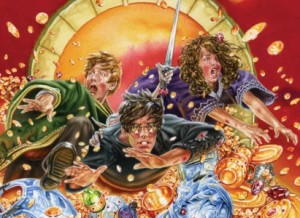What is that mysterious ticking noise?
No, it’s not a pipe bomb. It’s the countdown nearing the final chapter of the worldwide phenomenon that is Harry Potter.

Luckily for us desperate muggles, Warner Brothers made the decision to split the final book into two films: Part 1 of “Harry Potter and the Deathly Hallows” opens on November 18, with the second installment appearing in theatres in July.
As the concluding chapters are so close on the horizon, now it seems like an appropriate time to step back and consider the film series as it stands. Any decision made regarding the Potter film franchise is initially met with skepticism from its incredible, unprecedented fan-base.
The splitting of the final book, however, appealed to not just movie nerds like myself (who have grown weary of super-powered plots and sparkling vampires), but also to Warner Bros. stockholders.
Harry Potter becomes the boy who lived… through another fiscal year.
Outside the Warner Bros. boardroom and through Platform nine and three-quarters, our boy wizard has been through a lot in his years at Hogwarts: werewolves, teenage crushes, school rivalries and of course, He Who Shall Not Be Named. Harry’s great and episodic trials, however, pale in comparison to those that faced the producers of this cinematic octet.
How do you fit the scope and magic of Rowling’s opus into individual two-hour blockbusters that must appeal to a range of demographics more varied than a bag of Bertie Bott’s Every Flavor Beans?
How do you set the movies apart from the books without betraying the source material?
How do you get Emma Watson to not be so terrible at acting?
The short answer to all of these questions is simply that you can’t.
The first two films, both directed by Chris Colombus, put a great amount of effort into translating the books to the screen, which was a necessary misstep.
Audiences weren’t ready to move away from Rowling’s world into the celluloid version, the books weren’t ready to be properly adapted and Emma Watson wasn’t ready to do anything. The first two installments exist today as more supplements to the books, rather than films that stand on their own feet.
When thinking about the Potter films as a single, or at least consistent, narrative, I consider the third installment, “The Prizoner of Azkaban,” to be the actual starting point.
In adapting the book, the filmmakers took several important steps forward. Relying on a lesson from Peter Jackson’s “Lord of the Rings,” which used the reality of New Zealand to create the mythic fantasy of Middle Earth, the aesthetic approach to Harry’s world clearly shifts in this installment, solidifying the tone and texture for the rest of his journey.
Columbus was dropped as director and replaced by Alfonso Cuaron, who helped to finally create Hogwarts into a tangible place where I might someday visit to learn about potions or watch a Quidditch match, if only an owl were to drop an invitation down my chimney.
As the books began to grow in terms of substance and page count, the films had the task of focusing the gigantic narrative to single, feature-length installments that could develop throughout the series.
The fourth chapter, both in the books and the films, is a turning point for Harry. The whole narrative is propelled by Harry’s participation in a game, albeit one of grave danger and great personal risk. But the magic and innocence of his entire world is shattered with the death of a friend and the rise of a nemesis.
At the time, I remember seeing the midnight release of “The Goblet of Fire” and being outraged at the exclusion of the Quidditch World Cup, the wasted use of Rita Skeeter and the unstoppable whining of Emma Watson.
I unjustly held the film to the standard set by the novels, a habit our blogocentric generation cannot seem shake.
When preparing for the penultimate chapter, remember to watch the films by the parameters they set for themselves. Forget the fact that they left out X, Y, and S.P.E.W., and concentrate on how they translated Harry’s emotional journey.
I think they did this well. Others don’t agree. This is why we have blogs.
The ongoing conversation circulating this pop culture behemoth has been nearly as exciting as the books themselves.
Attending midnight releases of the next Potter thing has been a constant for most of my life.
I was 10 when the first book came out, the same age as Harry in the days before he was admitted to Hogwarts School of Witchcraft and Wizardry. In July, when the final installment of the film is released, I myself will have just graduated college, and like Harry, be thrust out into the real world.
With only two more of these late night releases left, engage in as much Potter-mania as you can.
Watch “Potter Puppet Pals,” “A Very Potter Musical” and, most importantly, “Wizard People, Dear Reader.” Make fun of Twilight fans (we are so much cooler), listen to wizard rock and make up drinking games!
Take a deep swig of Butterbeer every time someone says scar, magic or wand.
Take a shot of something stronger every time the wretched Harmony Granger says something insipid.




